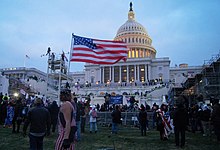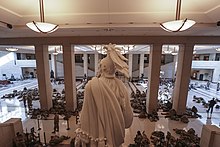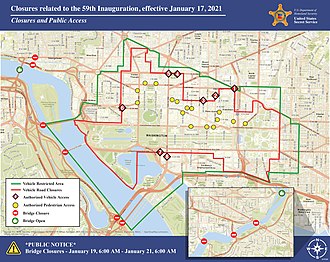
A | B | C | D | E | F | G | H | CH | I | J | K | L | M | N | O | P | Q | R | S | T | U | V | W | X | Y | Z | 0 | 1 | 2 | 3 | 4 | 5 | 6 | 7 | 8 | 9
 | |
| Date | January 20, 2021 |
|---|---|
| Location | United States Capitol, Washington, D.C. |
| Organized by | Joint Congressional Committee on Inaugural Ceremonies, Inaugural Committee |
| Participants | Joe Biden 46th president of the United States — Assuming office John Roberts Chief Justice of the United States — Administering oath Kamala Harris 49th vice president of the United States — Assuming office Sonia Sotomayor Associate Justice of the Supreme Court of the United States — Administering oath |
 | |
| ||
|---|---|---|
|
Incumbent Tenure
Vice presidential campaigns Published works
 |
||
| January 6 United States Capitol attack |
|---|
 |
| Timeline • Planning |
| Background |
| Participants |
| Aftermath |
The inauguration of Joe Biden as the 46th president of the United States took place on Wednesday, January 20, 2021, marking the start of the four-year term of Joe Biden as president and Kamala Harris as vice president. The 59th presidential inauguration took place on the West Front of the United States Capitol in Washington, D.C. Biden took the presidential oath of office, before which Harris took the vice presidential oath of office.
The inauguration took place amidst extraordinary political, public health, economic, and national security crises, including the ongoing COVID-19 pandemic; outgoing President Donald Trump's attempts to overturn the 2020 United States presidential election, which provoked an attack on the United States Capitol on January 6; Trump's second impeachment; and a threat of widespread civil unrest, which stimulated a nationwide law enforcement response. Festivities were sharply curtailed by efforts to prevent the spread of COVID-19 and mitigate the potential for violence near the Capitol.[1][2] The live audience was limited; members of the Congress attended with one guest of their choosing, resembling a State of the Union address.[3] Public health measures such as mandatory face coverings, testing, temperature checks, and social distancing were used to protect participants in the ceremony.[4]
"America United" and "Our Determined Democracy: Forging a More Perfect Union"—a reference to the Preamble to the United States Constitution—served as the inaugural themes.[5]
Context
The inauguration marked the formal culmination of the presidential transition of Joe Biden, who had become president-elect after defeating Donald Trump on November 3, 2020.[6] The victory of Biden and his running mate, Kamala Harris, was formalized by the Electoral College vote, which took place on December 14, 2020.[7] In accordance with Article I, Section 6 of the United States Constitution, Harris resigned her seat in the U.S. Senate effective noon on January 18, 2021.[8] Trump repeatedly falsely disputed the legitimacy of the election, but committed to an orderly transition of power exactly two months after losing.[9]
Upon his inauguration, Biden became the oldest president at 78 years and 61 days, older upon taking office than Ronald Reagan, who left office at 77 years and 349 days. He also became the first president from Delaware, the second Catholic after John F. Kennedy, the second non-incumbent vice president to be elected president after Richard Nixon in 1968, and the fifteenth vice president to serve as president. He became the first man since George H. W. Bush to have held the office of both President and Vice President, as well as the first Democrat to do so since Lyndon B. Johnson.[10][11] Harris became the first woman to hold a nationally elected office, and the first African American and first Asian American vice president.
Organizers
Joint Congressional Committee
The swearing-in ceremony for President-elect Biden and Vice President-elect Harris was planned by the Joint Committee on Inaugural Ceremonies, a bipartisan committee composed of United States Senators Roy Blunt (chairman), Mitch McConnell, and Amy Klobuchar, and United States Representatives Nancy Pelosi, Steny Hoyer, and Kevin McCarthy.[12][5] The committee is overseen by the Senate Committee on Rules and Administration.[5]
On December 8, 2020, Republican members of the committee voted against a resolution that would have publicly recognized Biden as the president-elect and Harris as the vice president-elect.[13] After Biden and Harris's win was certified by the Electoral College, Blunt and several other Republican senators finally acknowledged him and her as the president-elect and vice president-elect, stating that he will facilitate communications with Biden's presidential inaugural committee to prepare for the inauguration.[14]
Presidential Inaugural Committee
The 2021 Presidential Inaugural Committee organized several other inauguration‑related events at the direction of the president‑elect and vice president‑elect of the United States. The committee was led by Jim Clyburn, Eric Garcetti, Cedric Richmond, Lisa Blunt Rochester, and Gretchen Whitmer (co-chairs), Tony Allen (chief executive officer), Maju Varghese (executive director), Yvanna Cancela and Erin Wilson (deputy executive directors), David A. Kessler (chief medical adviser), and Adrienne Elrod (director of talent and external affairs).[15] The committee hired Stephanie Cutter and Ricky Kirshner, who produced the largely virtual 2020 Democratic National Convention, along with Glenn Weiss to organize the inaugural programming.[16]
Theme and programming
The Joint Committee on Inaugural Ceremonies chose the inaugural theme "Our Determined Democracy: Forging a More Perfect Union" to highlight the inaugural ceremony as a "hallmark of American governance and democracy" and stress the peaceful transition of power.[5]
Allen, Biden Inaugural Committee CEO, said the events would "look different amid the pandemic" but maintain inaugural traditions while engaging Americans in a safe manner.[15] This included several virtual concerts and events hosted by celebrities, featuring live musical performances and speeches that spanned five days—Saturday, January 16, 2021, through the evening of Inauguration Day.[17] The committee's inaugural theme was "America United" and its official YouTube channel and other social media featured exclusive content related to the ceremonies.[18]
Planning

On September 3, 2020, the Capitol Police Board announced that public access to the West Front of the United States Capitol would be restricted from September 7, 2020, to February 28, 2021, to "allow for the safe and secure construction of the Inaugural platform, stands, and other infrastructure necessary to support the event".[19] Construction began on September 29, 2020.[20] The traditional "first nail ceremony" commemorating the start of construction of the inaugural platform was not held because it coincided with the death and state funeral of Ruth Bader Ginsburg, the Supreme Court justice.[21] The platform can support 1,600 spectators. However, far fewer were permitted for this event, due to attendance restrictions designed to prevent the spread of COVID-19.[4] Another 1,000 people, often choirs and musical guests, are traditionally situated on risers above the platform, but these were not used at full capacity for this event.[5]
Costs
Compared to past inaugurations, the drastic reduction in crowd size at Biden's inauguration was expected to reduce costs.[22] Typically, presidential inaugurations cost about US$100 million.[22] In September 2020, prior to implementing attendance restrictions, costs were estimated to exceed US$44.9 million, with the District of Columbia's costs incurred in connection with the event being reimbursed by the federal government.[23] However, the storming of the Capitol two weeks prior to the inauguration on January 6, along with threats of nationwide unrest, significantly increased the need for security.[24] John Sandweg, a former Homeland Security Department official, remarked that the United States Secret Service likely has a surplus of funds because of lower-than-usual expenses during the 2020 campaign season, when presidential nominating conventions were mostly virtual and the travel of presidential candidates was curtailed due to the COVID-19 pandemic.[22]
Security and counter-terrorism efforts

The storming of the United States Capitol on January 6 raised concerns about the security of the inauguration.[25][26] However, Biden chose not to move the ceremony indoors, indicating that he believed a public, outdoor ceremony was necessary to demonstrate strength.[27] In response, organizers and officials made an unprecedented effort to secure the Capitol during the ceremony and deter people from visiting Washington, D.C., during the week of the inauguration over concerns of political violence. While several individuals were arrested near the Capitol in the days preceding the event for carrying illegal weapons,[28] disobeying police,[29] and trespassing,[30] and a fire near a homeless encampment prompted an evacuation of the grounds,[31] the ceremony proceeded without incident.[32] A heightened security presence remained in the city through the end of the month.[33]
Security operations

The inauguration, like all ceremonies since the first inauguration of George W. Bush in 2001, was designated a National Special Security Event (NSSE).[24] However, following the attack and reports of subsequent threats to disrupt Biden's inauguration and incite nationwide unrest, the Secret Service launched a security operation that surpassed any in modern U.S. history.[25][34] The Secret Service established a Multi-Agency Command Center (MACC) to coordinate security—formed six days earlier than planned—composed of agents and representatives from many government agencies (such as the FBI, U.S. Marshals Service, Defense Department, Park Police, and D.C. Metro Police) and private companies (including a gas company, CSX railroad, and Amtrak).[25] Combined efforts included:
- Activating more than 25,000 National Guard forces into the city—which may have been the highest since the American Civil War[35]—as a part of Operation Capitol Response, with members arriving from all U.S. states, three territories, and the District of Columbia itself.[36]
- Installing "non-scalable" seven foot-high crowd control barriers and jersey barriers with razor wire atop around the perimeter of the Capitol grounds.[37]
- Deputizing up to 4,000 local law enforcement officers from across the nation via the Marshals Service.[34]
- Strengthening aviation security at the three D.C.-area airports, increasing the use of random gate screenings, explosive detection dogs, and federal air marshals,[35][38] and tightening D.C. airspace restrictions.[39][40] Many major airlines also banned incoming travelers from checking firearms on board flights.[41]
- Assigning 750 active-duty military personnel to specialized units (including CBRN defenses, bomb squads, logistics and communications personnel, and medical personnel),[39] and aircraft and watercraft, including U.S. Coast Guard cutters and U.S. Air Force fighter jets.[39]
- The House Oversight Committee asked 27 transportation and hotel companies, including Avis, Hertz, Marriott, and Hyatt, to implement screening procedures to prevent the use of their services by domestic terrorists targeting the inauguration.[42]

Travel restrictions and site closures
- D.C. Mayor Muriel Bowser urged tourists not to visit the city,[43] and the Office of Personnel Management asked federal agencies to allow federal employees to work remotely.[38]
- The National Mall, which served as a non-ticketed viewing area in past ceremonies, and Washington Monument at its geographic center, were closed to the public.[44] Much of the surrounding downtown area near Capitol Hill, Union Station, the Lincoln Memorial, and White House came under significant parking restrictions and road closures.[45][46]
- Many Metrorail stations,[47] Metrobus routes,[48] Amtrak,[49] MARC,[50] and Virginia Railway Express commuter rail service lines were modified or suspended.
- Airbnb canceled all reservations in the city,[51] and a local hotel workers' union called on hotels to restrict guests to those providing inauguration security.[52]
- The U.S. Postal Service temporarily removed or locked public post boxes and suspended mail collection in Washington and several major U.S. cities to "protect postal property, employees, and the public".[53]
- The Commonwealth of Virginia closed four bridges connecting to D.C.—Theodore Roosevelt, Arlington Memorial, Interstate 395, and 14th Street.[54] A stretch of 10 miles (16 km) of the Potomac River between the Francis Scott Key Bridge and the Woodrow Wilson Memorial Bridge was closed to marine traffic.[55]
Pre-inaugural events
America United inaugural welcome
On the Saturday before the inauguration, America United: An Inauguration Welcome Event Celebrating America's Changemakers, opened the inaugural program through a series of musical performances and political speeches.[56][17] The live-streamed event opened with an original performance of "Everybody Deserves To Be Free" by the Resistance Revival Choir, a group of female and non-binary protest singers,[57] featuring a lead vocal by soul artist Deva Mahal.[56]
The Pledge of Allegiance was then led by members of the Girl Scouts. Mexican American producer Cristela Alonzo hosted the program, remarking that Biden's inauguration will be "the beginning of the next chapter" in American history.[56] New Mexico Congresswoman Deb Haaland then recounted the history of America's indigenous peoples, and introduced Quechan Indian tribal nation leader Claudette White, who joined in the performance of a traditional song.[56] After the performance, several female political organizers appeared and discussed the significance of Harris's election as the first female vice president.[56] Alonzo then introduced actor Nik Dodani, who emphasized the importance of Biden's inauguration, and civil rights activist Janet Murguía, who spoke of the political successes of women of color in the 2020 presidential election.[56] International, national, and local union leaders, including American Federation of Teachers president Randi Weingarten and National Education Association president Rebecca S. Pringle, along with leaders representing firefighters, government and service sector employees, steel, auto, postal, food, and communications workers then hailed Biden's win as a success for workers in their respective industries, citing his support of their causes, such as the Fight for $15.[56]
Zdroj:https://en.wikipedia.org?pojem=Inauguration_of_Joe_Biden
Text je dostupný za podmienok Creative Commons Attribution/Share-Alike License 3.0 Unported; prípadne za ďalších podmienok. Podrobnejšie informácie nájdete na stránke Podmienky použitia.
Antropológia
Aplikované vedy
Bibliometria
Dejiny vedy
Encyklopédie
Filozofia vedy
Forenzné vedy
Humanitné vedy
Knižničná veda
Kryogenika
Kryptológia
Kulturológia
Literárna veda
Medzidisciplinárne oblasti
Metódy kvantitatívnej analýzy
Metavedy
Metodika
Text je dostupný za podmienok Creative
Commons Attribution/Share-Alike License 3.0 Unported; prípadne za ďalších
podmienok.
Podrobnejšie informácie nájdete na stránke Podmienky
použitia.
www.astronomia.sk | www.biologia.sk | www.botanika.sk | www.dejiny.sk | www.economy.sk | www.elektrotechnika.sk | www.estetika.sk | www.farmakologia.sk | www.filozofia.sk | Fyzika | www.futurologia.sk | www.genetika.sk | www.chemia.sk | www.lingvistika.sk | www.politologia.sk | www.psychologia.sk | www.sexuologia.sk | www.sociologia.sk | www.veda.sk I www.zoologia.sk


